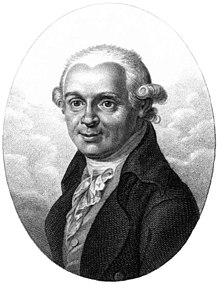
Back أبراهام فيرنر Arabic ابراهام فيرنر ARZ آبراهام قوتلوب ورنر AZB Абраам Готлаб Вернер Byelorussian Abraham Gottlob Werner Catalan Abraham Gottlob Werner Czech Abraham Gottlob Werner Danish Abraham Gottlob Werner German Abraham Gottlob Werner Esperanto Abraham Gottlob Werner Spanish
This article includes a list of general references, but it lacks sufficient corresponding inline citations. (May 2012) |
Abraham Gottlob Werner | |
|---|---|
 | |
| Born | 25 September 1749 |
| Died | 30 June 1817 (aged 67) |
| Nationality | German |
| Alma mater | |
| Known for | |
| Scientific career | |
| Fields | Geology |
| Institutions | Freiberg Academy of Mining |
| Doctoral advisor | Johann Carl Gehler |
| Notable students | Christian Samuel Weiss Christian Leopold von Buch Friedrich Mohs Henrik Steffens Gotthilf Heinrich von Schubert Franz von Baader Alexander von Humboldt |
| Signature | |
Abraham Gottlob Werner (German: [ˈaːbʁaham ˈɡɔtloːp ˈvɛʁnɐ]; 25 September 1749 – 30 June 1817) was a German geologist who set out an early theory about the stratification of the Earth's crust and propounded a history of the Earth that came to be known as Neptunism. While most tenets of Neptunism were eventually set aside, Werner is remembered for his demonstration of chronological succession in rocks; for the zeal with which he infused his pupils; and for the impulse he thereby gave to the study of geology. He has been called the "father of German geology".[1]
- ^ . Encyclopædia Britannica. Vol. 28 (11th ed.). 1911. p. 523.